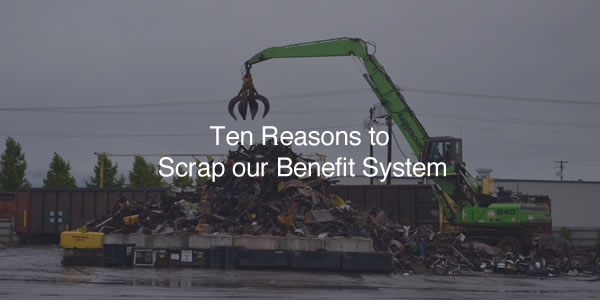Our current welfare system is broken, and is in need of a radical fix. It is time to ditch it, and start over. Here are 10 reasons why we think this is the case. Tomorrow we will look at what we would replace it with.
1. It stops people starting businesses or pursuing their dream job
Entrepreneurs create jobs and wealth. What help does welfare give them during this process? None. Instead if they are receiving benefits we make life difficult for them by tying their lives up with red tape and appointments they don’t want to attend. Same with people pursuing sporting or artistic careers.
2. It offers no assistance with study and retraining
People are better off on benefits than they are engaging in study or retraining. Likewise, people already in the workforce face huge costs and disruption if they want to retrain in order to improve their long-term prospects. Our benefit system gives them no help with this – it pushes them to stay in dead end jobs.
3. It can’t keep up with the realities of the modern workforce
The modern workforce is increasingly dynamic. Work and income is becoming sporadic and uncertain. Some beneficiaries respond to this by working when they can, but asking to get paid in cash or small regular amounts so that they avoid being stripped of their benefits.
Technology and globalization are also putting many jobs at risk and suppressing wages. The fact that we have Working for Families is a recognition that paid employment does not return enough income for some people to raise a family.
The response of our benefit system is to become more complex, which forces people to wade through endless eligibility criteria to get the benefits they need. Complex times call for a simple benefit system.
4. It necessitates government meddling in your life
By adopting a benefit system that targets benefits to people deemed to have need, government has to decide who is ‘worthy’ of support and who is not. Who are they to judge? For example, we pay more to an individual on superannuation than a couple on unemployment benefit.
As a result we end up with complicated criteria that means the average person needs help just to understand it and access to their entitlements. Many can’t manage that process, so they either miss out or are forced to turn to voluntary organisations that can help them wade through the paperwork.
5. It is incredibly bureaucratic
As a result of this complexity and targeting, our benefit system creates a lot of paperwork. To administer this complex system, we employ a cadre of bureaucrats. They are the only real winners from the current system.
6. It creates crazy incentives
Currently our benefit system gives larger benefit payments to people that have children, particularly those that live in sole parent households. Meanwhile unemployed people living with their partners are entitled to no benefits at all. Why does our system reward people for having children, or couples for separating, or discourage people finding co-habitation arrangements that work for them? Why do we have a system that treats two people in a similar situation in a completely different way, simply because of arbitrary criteria? A benefit system shouldn’t judge or try to influence life choices in this way.
7. It doesn’t recognise unpaid work
Many people provide a valuable role in society that they don’t get paid for – caring for children, disabled or the elderly, volunteering or even parenting. Sometimes the government recognises this effort – such as with paid parental leave – but sometimes it doesn’t. If a mother doesn’t go back to work in between her first and second child, she is not eligible for paid parental leave.
8. It creates a Poverty Trap
Ever wondered why some people stay on the benefit? It can sometimes be because they aren’t any better off in employment. Once they start earning money, they lose the benefit, so they end up no better off for all their efforts. The Government argues that low taxes are important so people have an incentive to work harder. Why are beneficiaries any different?
To reduce this problem and ‘make work pay’, the last Labour Government introduced Working for Families. This only succeeded in bringing millions more people into the benefit system and extended the poverty trap over a much larger income range.
9. To overcome the Poverty Trap, it resorts to bullying
When people won’t seek work because they have no incentive to do so, our welfare system responds by resorting to bullying. Once we have created a poverty trap, we have to introduce all sorts of punitive measures to push people into work that makes them no better off at all. Wouldn’t it be simpler to have a system that offers everyone an incentive to go back to work?
10. It robs people of their dignity
A targeted benefit system labels and stigmatises people as ‘incapable’ for no good reason. Stigmatising people doesn’t help them contribute to society.
Tomorrow we will look at what we would replace our current welfare system with.

